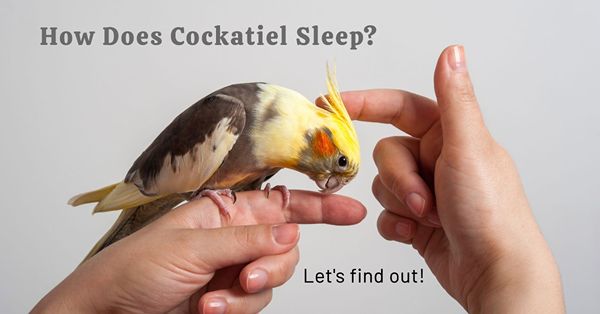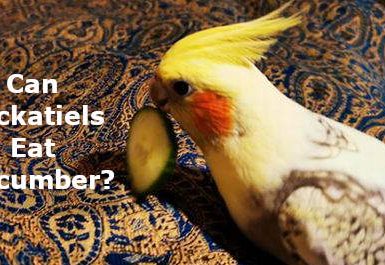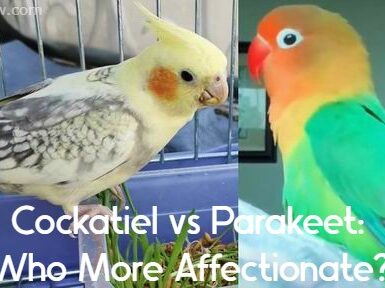
Cockatiels are not only beautiful birds that can delight the eye with their beauty, but can also amaze the mind with their mental abilities. A cockatiel’s attention to healthy sleep is considered one of the most important elements to his body and well being. To ensure that your youngster grows up healthy and well, it is important to observe the quality of his sleep and ensure that he sleeps well.
How to Ensure Healthy Sleep for Your Cockatiel?
It is important to consider that parrots are birds that live in their natural environment and hide at night. Consequently, creating natural conditions is the best way for the parrot to enjoy a good and healthy sleep.
Furthermore, sleeping in the cockatiels like with any other animal plays an important role in the body’s vital activity and renewal. During sleep, the process of self-renewal, the strengthening of the immune system, maintains hormonal and nervous balance. As such, sleep complete and measured sleep is parrot and depends on his health and mood.
How to ensure healthy sleep in a parrot
1. ensure a comfortable bedroom
In a moderately unoccupied environment, much more attention should be given to the bird. This can be done with a special cage or aviary in which the bird feels comfortable. The environment should be free of background noise and blind lighting.
2. set up a systematic day and night routine
All roosters are accustomed to a day and night regime. To provide proper relaxation for the birds, the exact time before they go to sleep and stay awake must be determined. This is typically 10-12 hours of sleep at night and 4-6 hours awake during the day.
3. ensure a comfortable bedroom.
Provide a comfortable sleeping area, for example, a branch or a special nest. You can use a special nest stand or place the nest in the bird’s cage. It is important to keep an eye on the nest and remove any objects that may be unsafe for the bird.
4. supervise the bird’s nutrition.
The right food for parrots can also affect the quality of their sleep. It is important to provide the bird with adequate calories, including vitamins and minerals. Keep an eye on the food bowl and make sure they are awake.
5. make the cage regular
Cleanliness of the henhouse also affects the healthy sleeping habits of the chickens. Clean feeders, drinkers, and cage bottoms regularly. Provide clean sleeping areas for the birds. Also check the temperature of the cage to make sure it is not too hot or too cold.
6. observe the bird’s behavior.
If the Cockatiels parrot does not doze properly, this may indicate illness. Pay close attention to the bird’s behavior and detect the setup immediately. Seek assistance from your veterinarian if necessary.
Proper Daily Routine
Cockatiels are birds accustomed to a natural life in the wild with their own day/night regime. Therefore, the correct daily routine must be followed to ensure healthy sleep for the bird.
Morning is the time when the birds get up and start moving. Then we wake the parrots and give them a snack.
In the afternoon, the birds become more active and playful. At this point, you need to provide comfort and toys for the parrots so that they do not become lazy and fall asleep in the evening.
Evening is the time when birds begin to sleep. Bathing your cockatiel before bed or jogging it around the cage will ensure that it is more tired and more likely to fall asleep at night than at other times.
Night is the time when cockatiels nap and protect themselves from outside enemies. To help students sleep at night, light should be blocked out and the room in which the cage is located should be quiet.
In other words, for the cockatiel, a correct routine is the source of healthy and comfortable sleep. Remember to take into account his biorhythms and follow them throughout the day. With your support, your child will sleep better and wake up more energized.
The Importance of Daily Habits for Parrot Health
As with any animal, daily routines and regular handling are essential to the health and physical balance of your cockatiel. Failure to follow daily routines can lead to stress, depression, and almost any other problem.
An important component of daily routines is a regular sleep pattern. They need space for entertainment in a moderate, calm environment, free of stress and pressure. If this is disturbed, birds can become stressed, restless, and brazen.
Irregular meal times and eating habits can also affect a parrot’s health. The bird should be fed at the same time each day so that it does not feel hungry or overworked.
In general, the most important thing to remember when designing a daytime routine for your parrot is to create a careful and stable environment. Be aware of sudden changes in routine and try to establish a regimen that is especially suited to your pet’s needs.
How to create a good daytime routine for your cockatiel
- Set specific feeding times: Corela should feed herself at specific times each day. Feeding before bedtime is not recommended as it may disturb sleep.
- Sufficient time to build up stamina: Corellas are very functional birds and need sufficient time to fly and perform. To ensure their comfort, leave them outside in a large area with lots of toys for 2-3 hours a day.
- Create breaks between training sessions: If you want to train your cockatiel, remember to create breaks between sessions. This will definitely make her less tired and allow you to focus on your training.
- Create a peaceful atmosphere at night: If the room is quiet and calm, Cockatiels will fall asleep more easily than anything else. Note the brightest light source in the room where she plays or naps.
- Simulate the dim mode of night. Cockatiels need a dimly lit environment to doze off. Turn off the lights and make sure the room is dark enough for the bird to sleep peacefully.
Comfortable sleeping areas
Avoid drafts.
When choosing a sleeping area for your cockatiel, make sure the cage is not located in a drafty area. Gaping winds can cause your cockatiel to catch a cold, which can be detrimental to its health and sleep.
Avoid humid areas.
Like other real-life creatures, Cockatiels have the ability to wake up when there is noise nearby. Choose a quiet cage area where your parrot can doze off without being disturbed by noise.
Choose a stable space.
Corellas are very active during the day and have every opportunity to hop, play, and talk loudly. Make sure the bird cage is in a stable, hazard-free area where the bird cannot fly or roll over if the parrot moves.
How do I choose a place for my parrot to sleep?
Choose a quiet space. Cockatiels can be sensitive to noise, so you should choose a sleeping space that is free of noise or disturbance.
Close curtains or awnings. Birds get stressed if they doze off in open areas, so make the corners of the room dark and comfortable by lowering curtains or mesh curtains.
Provides a light regime. For the Cockatiels parrot to function properly, it must systematically switch between light and dark. Cockatiels parrots require 8 to 12 hours of light and 12 to 16 hours of fog per day.
Choose a room with low drafts. Therefore, do not place the cage near an unclosed window or door.
Avoid humid areas and temperature fluctuations.
Cockatiels parrots are nocturnal animals, and sounds of no direct interest to humans may well awaken this bird. When choosing a space for the cage, avoid noisy areas such as TVs or video game consoles. It is not recommended to place the cage near a road or in a location that receives daily sunlight.
Furthermore, birds cannot tolerate sudden temperature changes or drafts. Cold or drafty environments can make your cockatiel sick. The ideal living temperature for cockatiels is 18-24°C (64-86°F). In winter, we recommend placing a support blanket in the cage and, if possible, purchasing a heater.
How can I feed my chickens properly for a good night’s sleep?
Choose food according to their natural needs.
If you want your Cockatiels parrots to sleep well, it is important to choose a food that meets their natural needs. The diet should contain all essential vitamins and minerals, as well as adequate protein and carbohydrates.
Pay attention to the quality of the feed
It is important to pay attention to the quality of the food fed to Cockatiels. Food should be crunchy and free of unnecessary additives such as flavoring and coloring. Also, check the expiration date and store in a dry, cool, dark place.
Pay attention to portions.
The optimal amount of food for Cockatiels depends on their weight and age. Do not overfeed as this can cause weight gain and digestive problems. Feed the rooster enough food, but do not overfeed.
A wide variety of menu items
Diversify the menu so that the birds get all the calories they need. Additionally, fruits and vegetables such as apples, carrots, and leafy greens can be fed to your parrots. It is important that supplemental feed does not replace the main feed, but rather supplements it.
Pay attention to the feeding schedule.
Pay attention to the feeding schedule so that the cockatiel does not eat very much in the evening. If the cockatiel eats before he goes to bed this can lead to sleep problems. Move in the direction of the day primarily to the bird and finish feeding in the afternoon under 3 to 4 years of age.
Complete substance and sensory peace.
Playroom
DeHaan needs a large play and bathroom area. For complete physiological entertainment, a large cage or aviary is needed. Needs toys of all kinds, branches to roll up, ladders, dwarf ridge, swings. Change the location of toys regularly so that the birds do not get bored with the alternative between activity and quiet.
Provide Comfort.
In addition to playing and resting, Corella Parrot needs a comfort standard of entertainment. It is important that the bird have a comfortable place to sleep where he can hide and cuddle. Also ensure sufficient light and light flicker so that he can regulate his daily rhythm and have a peaceful, moderate nap. Choose a special room for the parrot cage to ensure maximum temperature and humidity.
Social Contact
Cockatiels are very social and like to know and socialize with their owners. For full sensual entertainment, the cockatiel must be well cared for and fed by the owner. Remember to spend time with the bird, feed him healthy and nutritious food and train him with different commands and tricks. Allow for social contact, as parrots can also get to know their families.
Avoid stressful situations for your parrot well
Stress can have a negative impact on parrot wells, leaving both physiological and psychological. Causes of stress include inadequate space, lack of food and water, lack of light and air, other animals in the neighborhood, or inadequate food.
To prevent stress in parrots, owners should ensure that parrots have comfortable living conditions. Parrots need plenty of space in their cage or aviary so they can spread their wings and fly. They also need to have free access to food and water throughout the day, and their diet should be checked to make sure they get all the vitamins and calories they need.
Remedies for Stress Prevention in Parrots
Other means of preventing stress in parrots are timely cleaning of the cage or birds, keeping it dry and clean, an appropriate microscopic environment in terms of temperature and humidity, and protection against noise and stray light. Parrots should also have a black, quiet space with ample time to play and sleep. Then they should feel safe and use internal recreational means.
- Sufficient space inside the cage.
- Accurate and constant food.
- Clean the cage or aviary to keep it clean.
- Comfortable local climate, depending on the time of year.
- Avoidance of noise and stray light.
Hygiene for sleeping
Cage cleanliness. Parrots must be concerned about the purity of their sleeping area to prevent bacterial and fungal growth. Their cage should be cleaned regularly by wiping off dirt and replacing the ground cover.
Temperature and light. Overheating or overcooling of the birds should not be allowed; the room in which the De Haan lives must have a comfortable temperature. On the other hand, if the room is very cold, the bird must be supplied with extra warm air. Avoid direct sunlight on the bird as it can cause eye disease.
Sound and odor levels. As birds become accustomed to their environment, they become more sensitive to noise and scents. The cage should be kept calm. When cleaning the cage or if the room gas sensitive objects, windows should be placed or a ventilation system should be applied.
Sleeping place. It is important to provide a comfortable place for the birds to sleep. For this you can use special house or cage litter. Place a pod in the cage to give him a sense of safety and protection.
Clean water. Your parrot needs access to fresh water so that he can give lessons day and night. Remember to refresh the water daily and clean the water bowl to prevent contamination.
Nutrition and bedtime. Remember that good sleep patterns can only be achieved with good food. Provide a natural and nutritious table for the bird to ensure nutritious vitamins and minerals. It is advisable to offer a sturdy meal several hours before going to sleep so that the bird can eat and sleep peacefully.
How to Keep Roosters Clean
To keep them clean
– It is recommended that the cage be cleaned daily. Remove any residue from uneaten food, feathers, droppings, and other dirt.
Bedding should be changed once or twice a month. Toilet sand should consist of granular polystyrene and should be placed in a narrow layer 2 to 3 cm wide.
-Thoroughly wash the water trough daily.
Location of the cage
- The cage should be located in a clean area that is virtually free of sources of industrial and household waste.
- Cages should be located away from drafts and direct sunlight.
- Cages should be kept in a stable environment and should not be placed where they may be startled by noise or other animals.
Clean skin and feathers
- Bathe your bird regularly. Do this at least once a month using a bird shampoo.
- Use a soft brush or bird comb to remove dry skin and feathers from the hutch.
- Take care to prevent flying insects and parasites from entering the cage. If this occurs, treat the bird with insect repellent.
Questions and Answers:
Q: What is a cockatiel?
Answer: The cockatiel is the image of a small orange-yellow bird popular in Australia. They have an elegant appearance, charming demeanor, and calm temperament. They are considered pet birds and love to get to know their owners.
Q: What is the best environment for a Cockatiels parrot?
A: The optimal temperature for parrots is 18-26 degrees Celsius. They cannot tolerate sudden temperature changes or drafts. Therefore, it is important to maintain a comfortable temperature in the bird’s room for a long period of time.
Q: What food should I give my parrot before bed?
A: Before bed, feed your parrot a light, filling meal of grains, fruits, and vegetables. Most importantly, the food should be refreshing and of high quality. It is also important not to overfeed so that the bird does not suffer from unnecessary weight.
Q: What kind of lighting is needed in the room where the parrots live?
A: Cockatiels parrots prefer colorful lighting, but they do not need to be exposed to direct sunlight every day. The best lighting for them is 2000-3000 lux. If the lighting in the room is not sufficient, a special sunlight lamp can be used.
Q: How can I create a comfortable sleeping area for my parrot?
Answer: In order for parrots to sleep comfortably, you must build a comfortable nest. It should be smooth, warm and non-toxic. The nest can be stuffed with soft material or special nest fillings. It is also important to keep the nest clean and to replace the stuffing from time to time.






Add comment